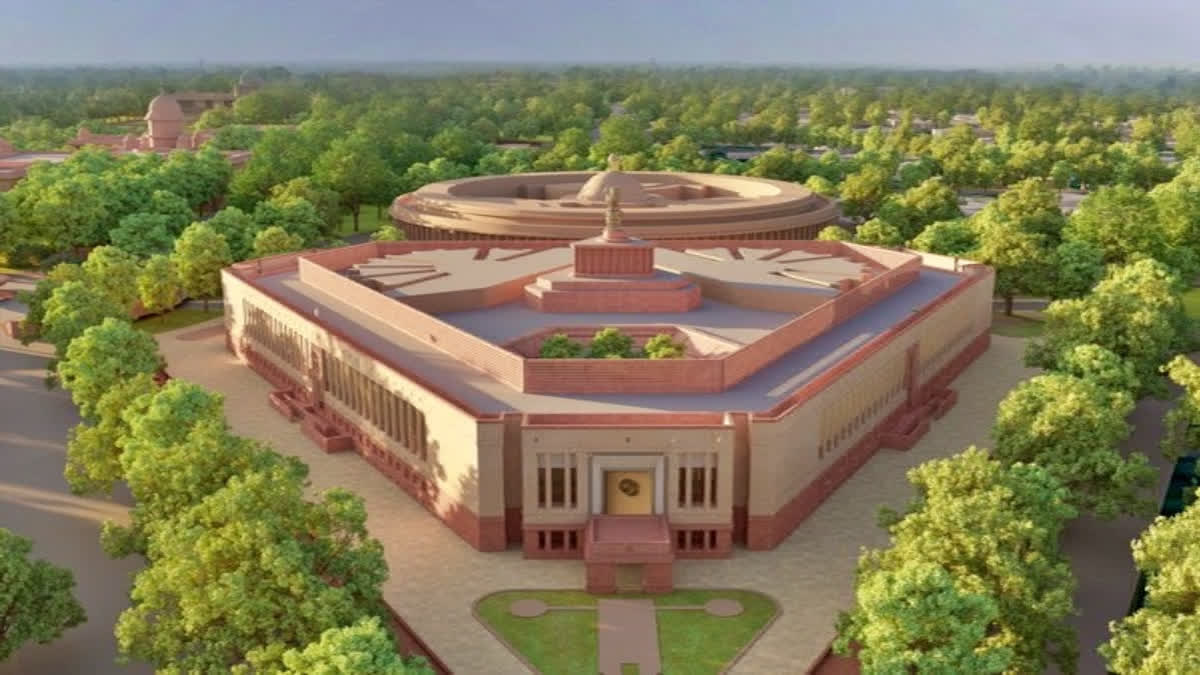New Delhi: As widely expected, Prime Minister Narendra Modi Sunday inaugurated the Parliament building, a project that bears his stamp on it and will leave his legacy in the country’s seat of power for a long time to come. However, Prime Minister Modi’s big day of inaugurating the new Parliament building was not without legal challenges.
The Central Vista Project and the construction of a Ram temple in Ayodhya of Uttar Pradesh have been considered two landmark projects of Prime Minister Narendra Modi. However, both faced numerous legal challenges. Unlike the construction of a Ram temple in Ayodhya, Central Vista was not supposed to be dragged into litigation, but no project of public importance in the country sees the light of the day without a legal battle be it metro projects, bullet train, highways and expressways or a new Parliament building.
The idea of constructing a new Parliament building is not a new one. Even during the first tenure of Prime Minister Narendra Modi, the then Lok Sabha speaker Sumitra Mahajan had proposed to construct a new Parliament building, but the idea was put on the back burner following resistance from some opposition leaders.
However, in the second term, Prime Minister Narendra Modi revived the idea with a sense of urgency to complete the renovation of the seat of power in New Delhi, which included building several new swanky buildings to house ministries and Central government offices, including the construction of a new and bigger Parliament building. However, in less than a year after assuming the office for the second term in May 2019, Covid-19 global pandemic struck the world and a nationwide lockdown was imposed on the country for three months, which was extended for another three months with some relaxation.
First legal challenge to the Central Vista project
No, later than the project was put in motion, the Central Vista project faced legal hurdles. In December 2019, a public notice was issued by the Delhi Development Authority (DDA), inviting objections to the proposed changes in the master plan. An individual Rajeev Suri filed a petition in Delhi High Court against this and the High Court directed the DDA to inform the court in furtherance of the said public notice.
The petitioner had challenged the grant of environmental clearance, the grant of approval by the Delhi Urban Art Commission (DUAC) and the Heritage Conservation Committee, the approval for land use change as per the DDA Act and the selection of a design consultant. However, the Centre filed objections to Rajeev Suri’s petition and a division bench of the Delhi High Court stayed the single bench order.
Aggrieved by the Delhi High Court’s double bench order, the petitioner moved to the Supreme Court. In response to the petition, the Supreme Court transferred the matter in March 2020. “We deem it appropriate that the entire matter about the challenge pending before the High Court is heard and decided by this court. Expeditiously,” the Supreme Court had said then. After the transfer of the matter to the Supreme Court, several other petitions were filed in the top court challenging the construction and renovation of the Central Vista project.
In its submissions, the Centre denied that the Central Vista project would compromise the heritage status of the old Parliament building and other adjacent areas. “The present project represents not a radical break from the past to lean on the future, rather entails a judicious policy attempt to conserve the delicate heritage and historical value of the area whilst allowing room for growth and development for future generations,” the Centre said in the Supreme Court.
In January 2021, a three-judge bench of Justice AM Khanwilkar, Dinesh Maheshwari, and Sanjiv Khanna, delivered a split verdict, paving the way for the Central Vista project. While Justice Khanwilkar and Maheshwari upheld the approvals and clearances granted for the Central Vista project.
The split verdict of SC cleared Central Vista
In a major judgement, Justice Khanna while agreeing with the majority views on approvals and clearances granted to the project also recorded his reservation with the view taken by Justice Khanwilkar on the count that the approval was bad in law for lack of public consultation as per the DDA Act, that there was no prior approval from the Heritage Conversation Committee and that the environmental clearance was granted without assigning reasons. However, despite the three-judge bench order of the Supreme Court. Another petition was filed in the Delhi High Court on the ground of a devastating second Covid wave, which was triggered by the Delta variant of the Covid-19 virus.
Legal challenge on account of health risk during Covid
Documentary filmmaker Sohail Hashmi and one Anya Malhotra filed a PIL in the Delhi High Court seeking to suspend the Central Vista project work due to health risks to the labourers and also to the general public. They contended that Central Vista was not an essential work, which was to be given an exemption during the lockdown period.
However, after hearing the submissions of the Union government that all Covid appropriate steps have been taken for safety of construction workers, a division bench of then Chief Justice of Delhi High Court DN Patel and Justice Jyoti Singh dismissed the PIL with the cost on the petitioners.
The High Court also termed the petition as motivated and dubbed the Central Vista project of national importance, which was to be completed on time. In June of that year, the Supreme Court upheld the judgement of the Delhi High Court and refused to give any relief to the petitioners against the imposition of a cost of Rs 1 lakh by the Delhi High Court. The bench of Justice Khanwilkar also noted that the petitioners have only singled out the Central Vista project while leaving out other ongoing projects.



